In late 2011, the Chinese comic artist Crazy Crab came to my attention when he kicked off the Dark Glasses Portrait project. As an internet meme in support of the blind activist lawyer Chen Guangcheng, the Dark Glasses Portrait encouraged netizens to post pictures of themselves wearing sunglasses. The meme was covered in local English-speaking outlets like Shanghaiist and picked up by US Congressman Chris Smith. It later won the Digital Communities award at the prestigious Ars Electronica.
For an article I wrote in The Atlantic looking at internet memes in both China and the United States, I conducted a long email interview with Crazy Crab, talking to him about his work, his motivations, and what it meant to engage in creative action online. In that article, I was only able to include snippets of what he said, but because the interview was so rich and enjoyable, I wanted to share it here (translated, of course).
Crazy Crab continues to produce comics for China Digital Times under the banner of “Hexie Farm”, meaning “Crab Farm.” Those of us familiar with the Chinese internet know that “crab” here refers to the “river crab”, a pun on the word for “harmony”. Harmony refers to the Harmonious Society vision of Hu Jintao, which led, among other things to extensive internet censorship. By referencing this tongue-in-cheek joke about censorship, Crazy Crab points at how his comic series frequently skewers the Communist Party’s use of propagandistic language and imagery. There’s another reference as well that will be familiar to English-speaking readers: Animal Farm, by George Orwell, a book about an animal uprising and the trappings of revolution.
Crazy Crab has just come out with a book, Crazy Crab’s Chinese Dream, featuring political cartoons from 2012 and 2013. For a more up-to-date interview, we highly recommend his conversation with Executive Editor Sophie Beach at the beginning, and the book’s comprehensive journey into China through a tumultuous year.
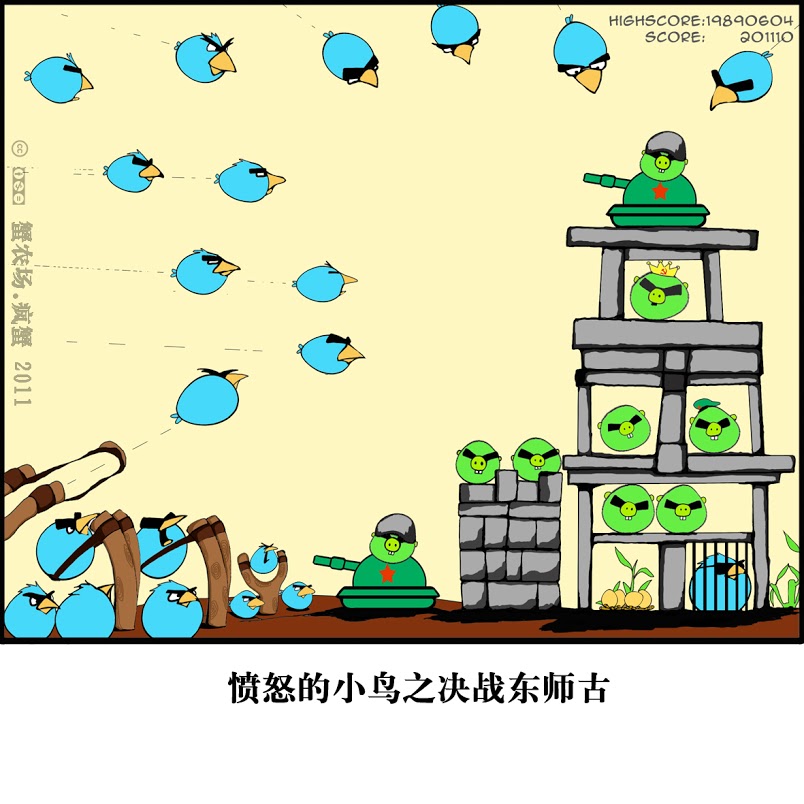
Angry birds attack Dongshigu to rescue Chen Guangcheng, the blind activist lawyer. Chen is represented as a blue bird wearing signature sunglasses, while the guards are represented as pigs.
Q: I love the Dark Glasses Portrait Project. What was your inspiration? Where did you get the idea?
A: Thank you! For me, this project is an interactive experiment. It has a few goals:
- To support Chen Guangcheng and to disseminate Guangcheng’s message in the hopes that more people know about him and stand up to support him.
- To collect every individual’s image and voice. And, in the process of collecting, to record this process and the thoughts of every participant.
- To hope that netizens, while clicking the mouse, move closer to actual action, and to send a picture in support of Guangcheng.
- To let every participant (including those who didn’t send in pictures) experience this mental process. I hope everyone can think, “Why do we have this fear? What is actually happening to China? Why? And what should we do about it?”
This idea was first inspired by the insideoutproject. When I began I wanted to make posters and place them all over the street as the second interactive action of protest. But because of problems around money and safety, I had no way of printing the posters in Mainland China. So the Dark Glasses Portrait project was not fully complete.
Q: Was the project effective? It seemed like many people participated.
A: The response was pretty good, but we didn’t receive the number of pictures we expected. Many participants on social media (for example Sina Weibo) took their profile photo and changed it to a Dark Glasses picture as a sign of support.
Maybe because the message wasn’t broadcasted smoothly, because there were opposing messages interfering with it. On top of that the project was blocked in the Mainland [i.e., Mainland China], participants were worried and scared, and various other reasons. Roughly only one of ten participants sent in pictures.
There were roughly ten foreign media outlets that published a report on this project. Also, seven human rights organizations helped this project and used the Dark Glasses poster picture. They supported Guangcheng.
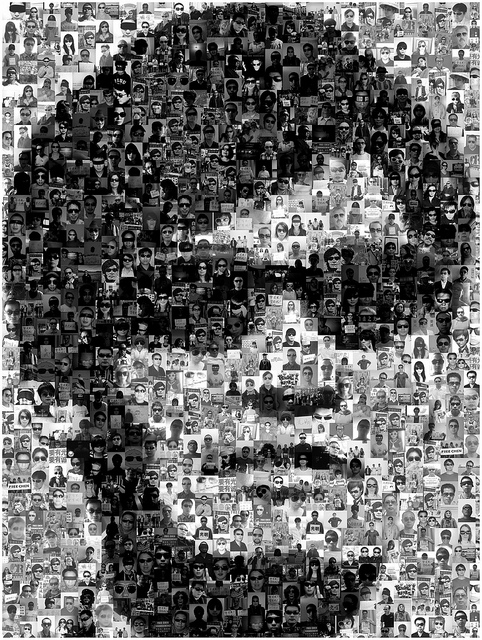
A mosaic of Chen Guangcheng supporters. The Dark Glasses Portrait project won a Distinction at prix ars electronica 2012. Image reprinted with a Creative Commons License via Flickr.
Beginning in December, there was a poster for this project. A number of people started printing the poster. People on the internet also printed out the [image of the] poster on a T-shirt, wearing it on their body to express their support. These ones are all encouraging. You can say that this project was a success. Every participant from within the Mainland all showed their courage.
Q: When you started, was it mostly Chinese people who participated? When did foreigners get involved?
A: For the first two days, we received only pictures from from Mainland China and Hong Kong. On the third day, we began to receive pictures from America; the participants were Chinese American. On the sixth day, we began to receive foreigners’ pictures.
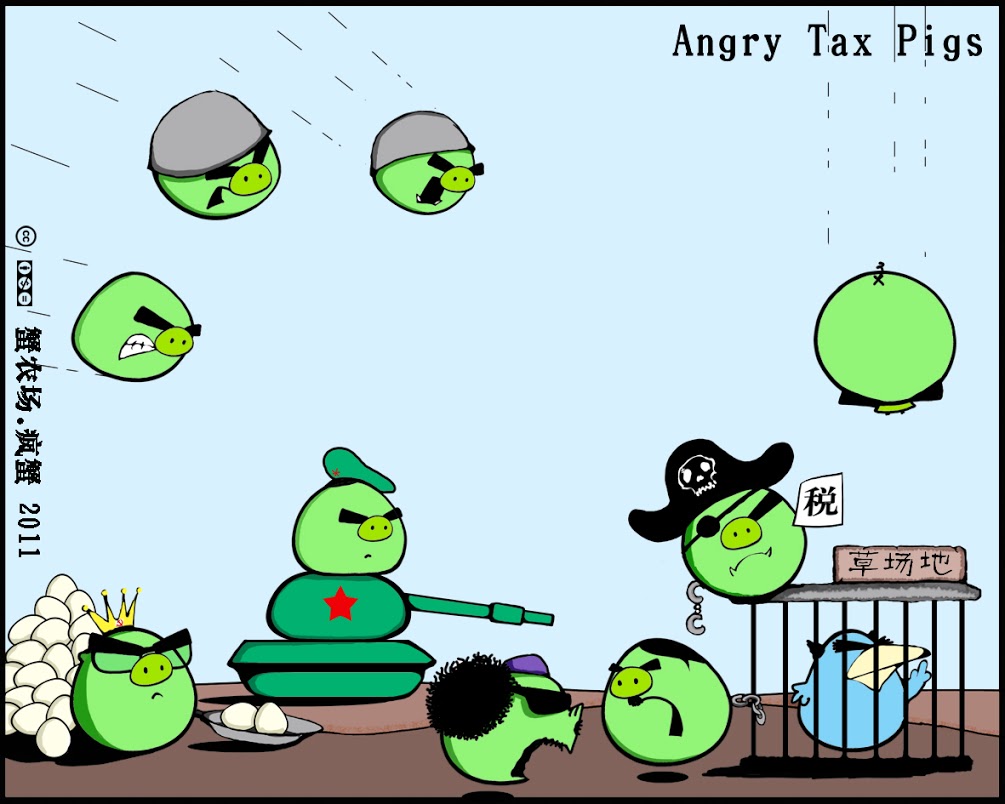
The Angry Birds theme was re-visited to create Angry Tax Pigs, a commentary on the tax charges levied on Chinese artist Ai Weiwei.
Q: How do you think the internet helped your project? Could it have been as successful without the internet?
A: If I didn’t have the internet or social media, I wouldn’t have been able to initiate this project. First and foremost, the internet gave me a platform for expression. This platform is open. With this platform, I didn’t need to go through newspapers, magazines or other kinds of traditional media outlets to express myself. If I have a good idea, I can become the media. The social internet can quickly and continuously spread news of the project. The web site can then collect and record all the participants’ portraits and voices. I feel, with the help of the internet, everyone is able to initiate a social project.
Without the internet, the chances of success is much lower, you probably need to put in a lot of extra effort. To do a project like this in China, you first need to consider the safety of your participants and guarantee the security of their information. You also need to think about how to eliminate interference. When you broadcast messages on social media, it’s very easy to come across opposing and interfering messages that cause the original message to be lost or altered. This is from my own experience, but I feel you must consider these two points whenever you’re starting a project.
I hope that internet projects will take a step further. I hope that more artists will join in; even if they remain anonymous, that’s okay. The participation of artists will allow voices to become more powerful and textured. I also hope that the project photos and voices will appear on the street, in the way graffiti and t-shirts are on the street. This requires a reliable and low-cost network of support.
Q: I hear that many people went to Linyi [the nearest town to where Chen was being held] and wore dark glasses to support Guangcheng. Was this report true? If it was true, do you feel they led the action because they also participated in your internet project? Was this what you mentioned about actual action?
A: Yes, a group of people wore dark glasses and went to visit Chen Guangcheng. They even used this project’s mosaic photo to create a banner in Linyi to protest. I don’t know how many people did this, it couldn’t have been that many. Moreover, due to the interference from opposing messages, these visitors using images from the Dark Glasses Portrait apparently didn’t know about the Dark Glasses Portrait Project, nor did they send in pictures.
The Dark Glasses Portrait Project and the visiting group operated together. We also tried to support and record those few brave visitors. When I saw that pictures of the Dark Glasses Portrait posters appeared in Linyi, I was very happy, and in extreme admiration.
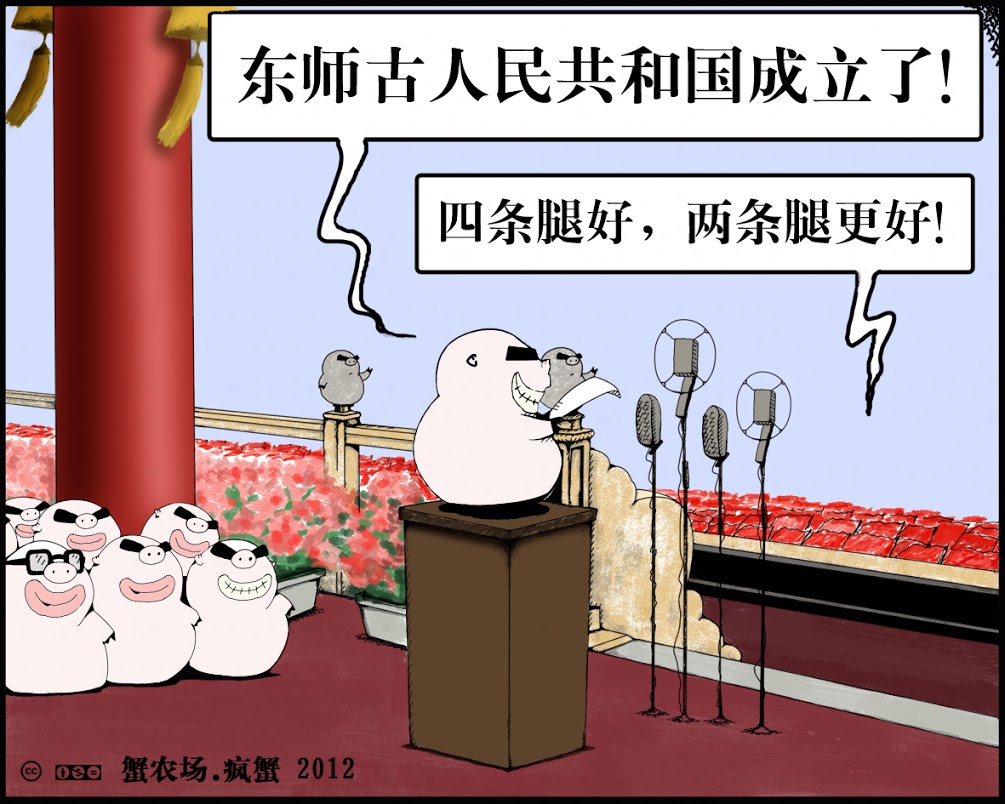
Referencing Animal Farm, this comic depicts pigs, representing members of the Politburo, addressing the People’s Republic of Dongshigu. In response, the people say, “Those with four legs are good, but those with two legs are better.”
Q: How many participants do you think you had for your project? How many at your website, how many on social media?
A: The Dark Glasses Portrait project asks participants to send in pictures and reflections. There were 648 participants who personally sent in pictures and left messages. I have no way of calculating how many people participated on social media. Within the Mainland, there are 3 Twitter-like microblogs (Sina, Tencent, and NetEase Weibo). On there, there were a number of people who changed their profile picture into a Dark Glasses picture as a show of support. But to protect the participants’ safety and image rights, I didn’t collect their pictures from social media. Pictures that didn’t go through licensing cannot be considered project pictures.
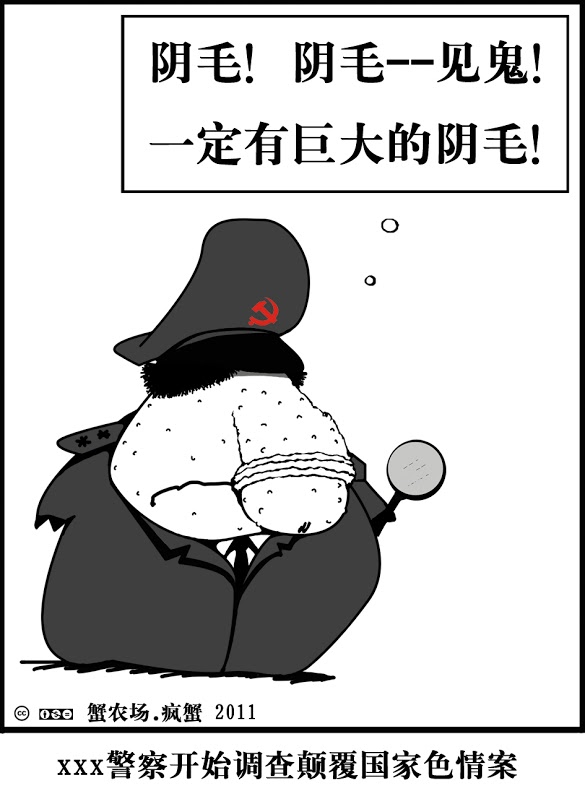
“Pubes! Pubes–Absurd! Surely there are huge enormous pubes! The xxx police begin investigating the case of the subversive’s pornography.” This cartoon looks at the hypocrisy of the anit-pornography investigation against Ai Weiwei.
Q: How many pictures were you expecting to receive? I thought that you had already collected quite a lot!
A: I expected to receive at least 6000 pictures. China has a population of 1.3 billion, and 500 million netizens. Can’t a call from a project for lawful citizens get more responses?
I believe this number reflects the reality of China, and it became a part of the project. There are many reasons, primarily:
- Strict censorship systems made it hard to send out news of the project.
- Opposing messages interfered with and confused supporters.
- Mental anxiety and fear. Even with the Dark Glasses covering up the face, many people still expressed their anxiety. This type of anxiety even came from those who were several thousands miles away in Europe and the United States.
- The threat from public security (secret police) is very big; many people received warnings. Everyday, my project inbox also received a great number of opposing messages and threats.
Although I didn’t get what I expected, I was still was very moved and grateful for the support of every single netizen who supported Guangcheng. They helped pass on pictures and news of the project; even when their account was deleted, they would still re-register and continue posting [Editor’s note: This was before Sina Weibo instituted its real name registration policy, requiring that users tie their accounts to their legal identification]. The pictures I collected were enough to use to create a mosaic poster, which was spread to even more places; this was plenty.
Even if there are people who didn’t send in pictures out of fear, this type of mental experience is also a part of the project. Up against injustice and evil, I believe they will not remain silent forever.
About Crazy Crab: Crazy Crab is an anonymous Chinese political cartoonist. He contributes regularly to China Digital Times.




